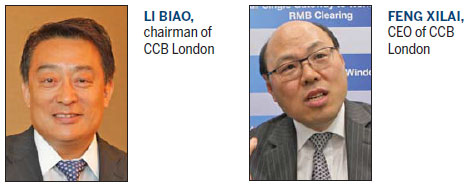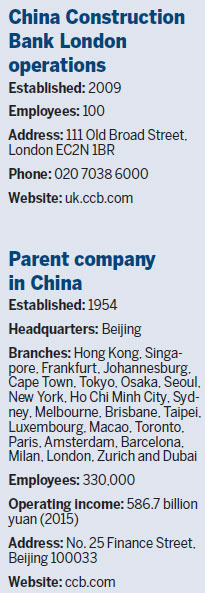Bank strengthens RMB hub importance
Since CCB became a yuan clearing bank in London, it has given the city a lift among those handling the yuan internationally
China Construction Bank is rapidly establishing itself as a global bank in London, where it is playing a significant role in supporting the renminbi's internationalization and aiding Chinese companies' going-global strategy.
Since CCB became London's renminbi clearing bank in June 2014, it has facilitated the clearing of a huge number of renminbi transactions - some 10 trillion yuan ($1.5 trillion; 1.3 trillion euros) as of August.
|
China Construction Bank's London office. Cecily Liu / China Daily |

CCB's renminbi clearing expertise supports London's ambitions to become the premium Western hub for renminbi activities. A milestone was reached in April when London's renminbi transactions topped those of Singapore, making it the second-largest offshore renminbi center behind Hong Kong.
The CCB's acquisition of a London branch license in 2014 also boosted its lending and financing capabilities, allowing it to better support Chinese companies expanding internationally.
The bank is also expanding its products and services. One example is its acquisition of a 75 percent stake in the London Metal Exchange broker Metdist in October, which gives it more participation in London's metal trading, crucial to helping clients hedge commodity risks.
"We aspire to be known as a top global bank, instead of just a Chinese bank," says Li Biao, chairman of CCB London.
Founded in 1954 in Beijing, CCB is one of China's Big Four banks. It was listed on the Hong Kong Stock Exchange in 2005 and on the Shanghai Stock Exchange in 2007. At the end of 2015, the bank's market capitalization reached $173.3 billion, fifth among listed banks worldwide.

Li says CCB's overseas growth has been particularly fast in recent years, and London is a crucial location.
"Now is an unprecedented moment where Chinese banks like CCB can truly focus on playing a key role in integrating China's economy with the global economy and helping the renminbi become a global reserve currency, and not just focus on their immediate commercial gains," says Feng Xilai, CEO of CCB London.
Feng says London's contribution to renminbi transactions is likely to grow as the renminbi's exchange rate fluctuates around its equilibrium exchange rate.
"This new state of two-way exchange rate fluctuations is different from the renminbi's exchange rate movement trend over the past 10 years. Over the past 10 years, the renminbi mostly appreciated against the dollar after it was taken off its previous currency peg, but now this appreciation will no longer continue as the currency has already reached an equilibrium rate," Feng says.
Li adds that the amount of renminbi used in investment and financial derivative product trading in London is growing.
Another factor behind London's growth in renminbi transactions is the increasing amount of cross-border renminbi activities originating elsewhere that are cleared through London, Li says. The Chicago Mercantile Exchange has opened an account with CCB London to clear all of its renminbi-related transactions through London.
CCB London provides renminbi clearing services for 67 financial institutions, of which only 24 are Chinese, showing the highly international nature of its work.

In 2009, CCB started operations in the UK by establishing a subsidiary in London. Back then, its lending and financing capability was limited because foreign bank subsidiaries in the UK can only lend in proportion to the subsidiary's capital base. That changed when the CCB received a branch license in 2014, granting it lending and financing capacity proportional to the capital base of its parent bank.
Feng says that previously, CCB London's subsidiary capital base only amounted to $200 million, and because loans made to each client could amount to only 25 percent of this amount, his staff normally provided a maximum loan of some $40 million to $45 million to each client.
"For some clients, this is really not enough. Take our client petrol companies, for example, which require loans to buy barrels of oil in the UK market. Each small ship of oil they buy would cost about $100 million, and each big ship of oil would cost about $200 million, so our maximum financing for them could not even buy half a ship of oil, which is why they would naturally go for loans provided by Western banks," Feng says.
But because the CCB's parent company has a capitalization of more than $200 billion, the CCB London branch can now easily satisfy the needs of companies.
Also, because the branch is able to finance its loans to businesses using its parent bank's high credit rating, its financing costs in London's local market are much lower, giving it the ability to lend to London businesses with favorable interest rates.
Prior to the branch's establishment, CCB London financed about 90 percent of its loans from China, but now it finances about 50 to 60 percent of loans from London. It raises funding through commercial paper, certificate of deposit and money market loans, with many Western commercial banks and foreign central banks as investors.
Its enlarged financing capability also means it is able to expand its client base to include many Western businesses. Before the branch's establishment, loans to non-Chinese businesses were only about 10 percent of CCB London's overall lending. Now it's about 40 percent. CCB is also taking on an increasing amount of investment banking and complex financial activities, including derivatives trading and commodity trading.
Feng says he sees tremendous growth opportunities, especially because Chinese firms are increasingly going overseas for mergers and acquisitions.
"Chinese banks' investment banking activities are rapidly growing in China and overseas, against the global trend where European banks are cutting their investment banking activities. One key reason behind this trend is economic recession across Europe in recent years, and because financial activities cannot run in isolation to real economic activities, European investment banks are losing competitiveness in this field and Chinese investment banks are stepping in to fill this gap," Feng says.
Many European banks have reduced their activities in commodity trading while Chinese banks have increasingly participated in London's commodity trading and commodity pricing. It was within this context that CCB acquired its 75 percent stake in Metdist.
"China currently consumes 40 percent of the world's metals, but only half of this amount is hedged using financial instruments, meaning the market potential to increase hedging for China's commodity consumption is enormous," Feng says.
Hedging, using financial derivatives like futures and options, effectively locks in the prices commodity buyers would need to pay at a future date and is an important way to control risks from price fluctuations.
In London, the CCB has about 100 employees, around 30 of which are seconded from the bank's headquarters. Around 30 of its local hires are ethnic Chinese employees and the rest are international employees.
"Our corporate culture is a good integration of Chinese and Western culture," Li says.
cecily.liu@chinadaily.com.cn
(China Daily European Weekly 09/16/2016 page30)























